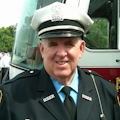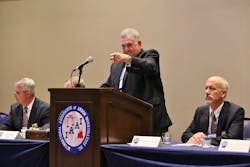40th Anniversary: Opening My Eyes to a Broader Fire Service Universe
To some old fire dogs, 1976 wasn’t that long ago. The nation was celebrating its 200th anniversary. Open cab fire apparatus ruled, and the back step was the preferred riding position. It wasn’t until late in the year that Ted Turner began sending a local TV signal from Atlanta via satellite for rebroadcast to a handful of stations. To the frontline firefighters today, 1976 is ancient history. Many of their parents were toddlers—or weren’t even born yet.
Sure, there were good fire service publications back then. Journals were the only medium that existed to connect the fire service. They were primarily technical publications reporting on large fires. They were filled with training articles.
Then a fireman at FDNY captured in print the gritty and dangerous job of answering alarms in the Big Apple. The author, Dennis Smith, building on the success of The Report from Engine Company 82, established a monthly that, for the first time, described the fire service culture. Reporting included the traditional commentary about the events critical to fire suppression and prevention, but Firehouse had something else. There were articles that explained the essence of what it meant to be a firefighter and how that relationship connects to being a member of the greater fire service family.
I remember receiving that first edition, and I have been a subscriber ever since. Firehouse had lots of photos and first-party descriptions of major responses. In subsequent editions, letters to the editor offered various points of view. That section provided readers, and still does, a way to form reasoned personal opinions. Often the responses are penned by the giants of the fire service industry.
There were pieces about life in the fire station. Recipes came from some of the best firehouse cooks in the country. In the same edition, there might be a hard-hitting editorial on needed change. Solemnly, every month the magazine is dedicated to brothers and sisters who answered their final alarm. Reporting comes from the smallest volunteer department to the largest metro. Firehouse really tries to cover the entire fire service.
Firehouse whetted my appetite to learn more about the opinion leaders and the fire service world. I had been a member for about 13 years before Firehouse. My knowledge base pretty much revolved around the back room of my fire station. That changed. I found in Firehouse there were places that were like us and places that did things a whole lot differently. Ideas in the magazine helped me think critically.
In 1976, I never thought that I would be writing for Firehouse in 1999, on the cusp of the new millennium, providing opinions about what the fire service would look like in 2025. In case you are wondering, I located that piece and reread it. Seventeen years out, the predictions are pretty accurate.
Along the way, I felt the pride of seeing my department featured on two covers. One, an action shot at a working alarm in the December 1991 edition, and the other, my Fire Chief Steve Kavanagh on the memorable fold-out cover “Protecting Our Nation” following 9/11 in the August 2002 issue. Those are framed and hang in our stations.
It has been an honor to write for both the print edition and the website. As much as that is important to me, a far greater experience was the opportunity to become friends with many staff members and contributors who throughout the years helped Firehouse and later Firehouse.com reach the prominence it enjoys today. Sadly, some of those friends—including former Editor-in-Chief Harvey Eisner, Publisher Bruce Bowling and political columnist Hal Bruno—have passed on. Their legacy lives in the pages of the magazine and the website. Sentimentally, I treasure their memory in my heart.
I enjoy and subscribe to most all of the fire service publications and honestly don’t rank one above the other. But it was Firehouse—before the Internet, before social media and before I ever met any fire service leader outside of my own state—that opened my eyes to a broader fire service universe. For that I am grateful.
About the Author

Steve Austin
Steve Austin is a life member of the Aetna Hose, Hook and Ladder Company of Newark, DE. Over the years, he has been fortunate to be at the right place at the right time as many national fire service issues unfolded.
